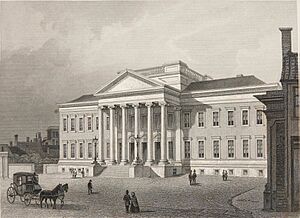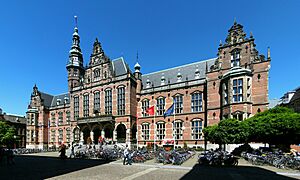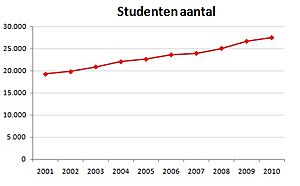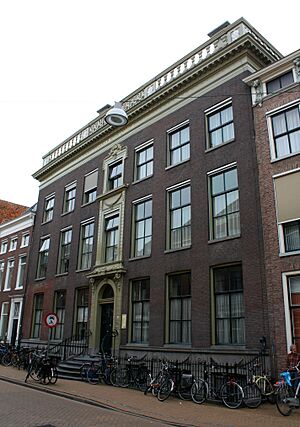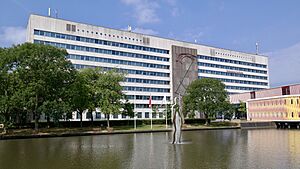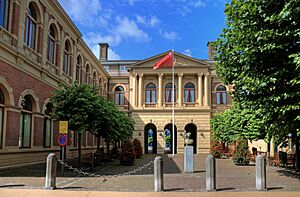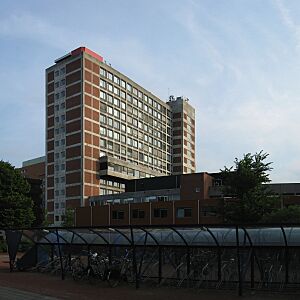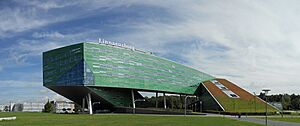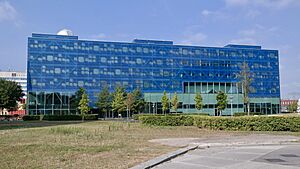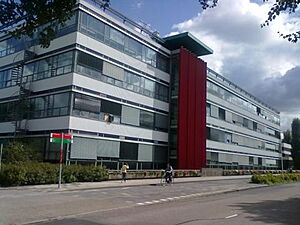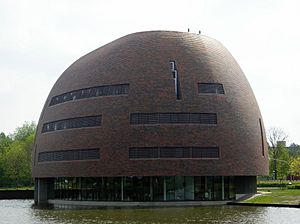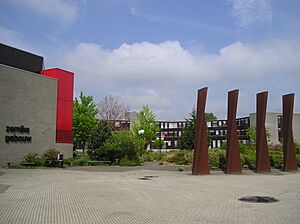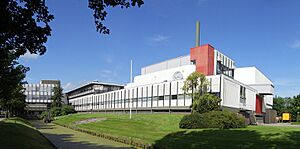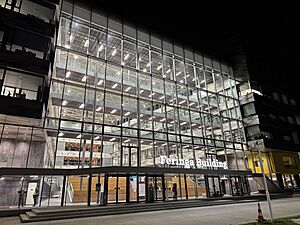University of Groningen facts for kids
|
Rijksuniversiteit Groningen (RUG)
|
|
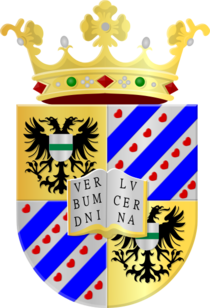 |
|
| Latin: Academia Groningana | |
| Motto | Verbum Domini Lucerna Pedibus Nostris (Latin) |
|---|---|
|
Motto in English
|
The word of the Lord is a light for our feet |
| Type | Public research university |
| Established | 1614 |
| President | Jouke de Vries |
| Rector | Jacquelien Scherpen |
|
Academic staff
|
3,600 employees (in 2020) |
|
Administrative staff
|
6,250 employees (27 May 2021) |
| Students | 34,000 (in 2020) |
| 4,350 (in 2020) | |
| Location |
,
53°13′9″N 6°33′46″E / 53.21917°N 6.56278°E |
| Colours | UG Red, White & Black |
| Affiliations | Coimbra Group Guild of European Research-Intensive Universities |
 |
|
The University of Groningen (often called UG) is a big public university in the city of Groningen, Netherlands. It has more than 30,000 students. Founded in 1614, it is one of the oldest universities in the Netherlands, second only to Leiden University.
The University of Groningen has eleven main departments called faculties. It also has nine special schools for advanced studies and many research centers. Students can choose from over 175 different study programs. Many famous people have studied or worked here. These include four Nobel Prize winners, important politicians, and even members of the Dutch royal family.
Contents
History of the University
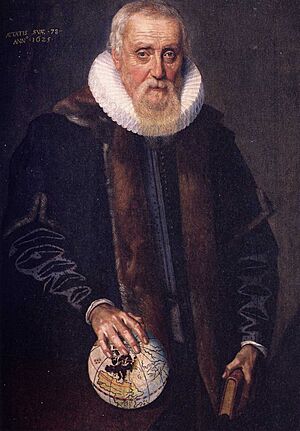
The university started as a college in 1614. It was created by the local government of Groningen and the surrounding areas. At first, it had four main study areas: Theology, Law, Medicine, and Philosophy.
The university's special symbol, its coat of arms, was approved in 1615. It shows the local area's symbol with an open book on it. The book has Latin words that mean "The word of the Lord is a light for our feet." A golden crown sits on top of the shield.
In its first 75 years, about 100 students joined each year. Many students and teachers came from outside the Netherlands. For example, the first leader, Ubbo Emmius, was from Germany. But the university also had strong ties to the city and its region.
The university's growth slowed down in the late 1600s and 1700s. This was due to disagreements and political problems. One difficult time was in 1672 when the city was under attack for a month. During this time, students even formed a volunteer company to help defend the city. About 200 to 300 students were enrolled during this period.
During the time when France controlled the Netherlands (1775-1814), the University of Groningen was managed by the Imperial University of Paris. It was not closed down like some other universities. It was even the only open university in the country for a while. After the Napoleonic Wars in 1815, it became a national college. A new main building, the Academiegebouw, was built in 1850. The people of Groningen helped pay for it. Sadly, this building was completely destroyed by a fire in 1906.
In 1876, a new law greatly improved the university's standing. It was officially renamed "Rijksuniversiteit Groningen" (RUG). Teaching was done in Dutch and Latin. The university was given the important job of doing research, not just teaching.
The University of Groningen grew a lot in the early 1900s. More departments and courses were added, and the number of students increased quickly. In 1914, there were 611 students. By 1924, this number had grown to 1,000. After a dip during hard economic times and World War II, student numbers rose fast. By 1994, there were 20,000 students. Today, around 32,700 students attend the university. Many international students, especially from Germany, continue to join, following a long tradition.
Facts and Figures
Here are some interesting facts about the University of Groningen:
- In 2020, the university had 34,000 students. This included 8,250 students from other countries.
- The university has 3,600 academic staff members. About one-third of them are from other countries.
- There are over 425 full professors.
- The university offers more than 45 bachelor's degree programs. Over 35 of these are taught in English.
- There are more than 120 master's degree programs taught in English.
- The university has 11 faculties (main departments) and nine graduate schools. One faculty is in Leeuwarden.
- Over 140,000 people have graduated from the university.
- Students and staff come from over 120 different countries.
- The university publishes about 8,000 research papers each year.
- In 2020, there were 4,350 PhD students, with 51% of them being international.
- The university's budget is about 1 billion Euros.
The university uses a system called BSA (Binding Study Advice). This means first-year students need to earn a certain number of credits (ECTS) to move on to their second year. The exact number of credits needed can vary.
The RUG has its own newspaper called Universiteitskrant.
The university's Center for Information Technology (CIT) has a very powerful computer called a supercomputer. It also has a special center for Virtual Reality and 3D-visualisation.
University Rankings and Reputation
| University rankings | |
|---|---|
| Global – Overall | |
| ARWU World | 69 (2024) |
| CWUR World | 106 (2023) |
| CWTS World | 112 (2023) |
| QS World | =147 (2026) |
| THE World | =80 (2025) |
| USNWR Global | =76 (2025) |
The University of Groningen is known worldwide for its quality.
- It is part of the "Excellence Group" of universities in Europe. This group includes only 56 universities out of about 4,500 in Europe.
- The RUG is considered one of the top 100 large research universities in the world.
- In 2021, it was ranked 80th in the Times Higher Education World University Rankings.
- The Faculty of Economics and Business is highly rated. In 2019, it was 3rd in the Netherlands and 32nd in the world for Economics and Business.
- In 2021, the university was ranked 64th in the Academic Ranking of World Universities (ARWU). It also ranked in the top 100 for specific subjects like Psychology and Business Administration.
- The university was ranked 139th worldwide in the QS World University Rankings 2024.
- In 2021, the university was ranked 3rd in the UI GreenMetric World University Ranking. This ranking looks at how sustainable universities are. It checks things like energy use, waste, water, and transportation.
- In 2019, the university was ranked 1st in the Netherlands by U-Multirank. This ranking looks at teaching quality, research, and how international a university is.
How the University is Organized
The University of Groningen has 6,250 employees.
The university library was updated between 2013 and 2017. The RUG also has a smaller campus in Leeuwarden. A University Museum is currently being created.
The University of Groningen helps to protect important university collections and cultural treasures.
University Departments (Faculties)
The University of Groningen is divided into eleven main departments, called faculties. These faculties offer many different programs and courses. They cover subjects like humanities, social sciences, law, economics, business, geography, life sciences, and natural sciences. Each faculty offers bachelor's, master's, and PhD programs. Some also have shorter courses.
Since 2014, the RUG also has a special college called University College Groningen (UCG).
Here are the faculties:
- Faculty of Economics and Business
- Faculty of Arts
- Faculty of Law
- Faculty of Religion, Culture and Society
- Faculty of Philosophy
- Faculty of Behavioural and Social Sciences
- Faculty of Medical Sciences
- Faculty of Science and Engineering
- Faculty of Spatial Sciences
- University College Groningen
- Campus Fryslân
University Campus
The university's different departments are located all around the city of Groningen. Many faculties, like Law, Arts, and Philosophy, are in the city center. The university's first building, which is now the main office, is right in the middle of the city. The medical faculty is nearby at the University Medical Center Groningen(UMCG).
Other faculties, like Economics and Business, Spatial Sciences, and Science and Engineering, are on the northern edge of the city. This area is called the Zernike Campus, named after Nobel Prize winner Frits Zernike. The Zernike Campus is also shared with the Hanze University of Applied Sciences. This means about 40,000 students study there in total.
The university has libraries in three places: the main one in the city center, one at the Zernike Campus, and one at the medical faculty. These libraries have many books and online materials for students. The university also recently opened a new campus in Leeuwarden, Friesland, called "Campus Fryslân." It offers many different subjects for both undergraduate and postgraduate students.
Student Life
Groningen is known as a student city in the Netherlands. About one-third of the people living in the city are students. They attend either the University of Groningen or the Hanze University of Applied Sciences. The university offers many sports activities and courses through ACLO. Almost every sport has its own club, and students can use their facilities at a lower cost.
The university also has many student groups that organize social events. There are also study associations that focus on specific subjects or faculties.
Using bicycles is very common for both locals and students to get around. There are special bike paths from the city center to Zernike. Because of this, the city is often called "The World Cycling City."
Student Housing
The University of Groningen does not have its own student dorms. However, it helps students find places to live through SSH Student Housing. This organization manages student houses in Groningen and other Dutch cities. Many students also find private apartments in the city. Another option for housing is The Student Hotel. To help with housing shortages, the city has encouraged building short-term places like The Village, which uses shipping containers for international students. The Dutch government has rules to make sure rent prices and conditions are fair for students and landlords.
In recent years, there have been challenges with finding enough housing for students in Groningen. This is because many students come from other parts of the country or the world. The university and city are working to address this issue and help students find suitable places to live.
Research at the University
The University of Groningen is a place where a lot of important research happens. In 2023, 635 PhD degrees were given out here. About 60% of the new PhD students came from other countries.
The university has many research groups and institutes. They study a wide range of topics, from how our brains work to new materials and energy. For example, there are groups that study language, history, law, and how people behave. Other groups focus on life sciences, like how our bodies work and how to find new medicines. There are also institutes for science and engineering, looking into things like chemistry, physics, and artificial intelligence.
Notable People from the University
Many famous people have studied or worked at the University of Groningen.
Leaders of Countries
- Paramanga Ernest Yonli, former Prime Minister of Burkina Faso
- John Stuart, 3rd Earl of Bute, former Prime Minister of Great Britain
- Suzanne Camelia-Römer, former Prime Minister of the Netherlands Antilles
- Etienne Ys, former Prime Minister of the Netherlands Antilles
- Johan Remkes, former Deputy Prime Minister of the Netherlands
Business Leaders
- Bart Becht, former CEO of Reckitt Benckiser
- Maarten van den Bergh, former Chairman of Lloyds Bank
- Marc Bolland, former CEO of Marks & Spencer
- Dolf van den Brink, CEO of Heineken N.V.
- Paul Polman, former CEO of Unilever
- Roel de Vries, Global Head of Marketing at Nissan Motor Corporation
- Hans Wijers, Chairman of the Supervisory Board of ING
- Chris Vogelzang, CEO of Danske Bank
- Marjan Rintel, CEO of KLM
Economists and Scientists
- Wim Duisenberg, the first president of the European Central Bank
- Klaas Knot, current President of the Dutch central bank
- Dirk Stikker, former Secretary General of NATO
- Gerbrand Bakker, a physician from the 1800s
- Johann Bernoulli, a famous mathematician
- Bart Bok, an astronomer
- Hans van Abeelen, the first Dutch behavior geneticist
- Corina Brussaard, a researcher of viruses in the Antarctic
- Anita Buma, a researcher of marine life in the Antarctic
- Ben Feringa, who won the Nobel Prize in Chemistry in 2016 for his work on tiny machines
- Heike Kamerlingh Onnes, who won the Nobel Prize in Physics for his work with very cold temperatures
- Frits Zernike, who won the Nobel Prize in Physics in 1953 for inventing a special microscope
Politicians
- Job Cohen, former mayor of Amsterdam
- Pim Fortuyn, a lecturer who became a politician
- Pavela Mitova, a member of parliament in Bulgaria
- Niccolò Invidia, a member of parliament in Italy
- Jacques Wallage, former mayor of Groningen
- Halbe Zijlstra, former Dutch Minister of Foreign Affairs
- Bruno Bruins, former Dutch State Secretary for Education, Culture and Science
Other Notable People
- Albert Hofman, an epidemiologist
- Turtle Bunbury, an Irish historian and author
- Ubbo Emmius, the first leader of the University of Groningen
- Willem Frederik Hermans, a lecturer and writer
- Gerardus Heymans, a philosopher and psychologist
- Aletta Jacobs, the first woman in the Netherlands to become a doctor
- Wubbo Ockels, the first Dutch astronaut
- Jan Oort, an astronomer
- Prince Maurits van Oranje Nassau, a cousin of the Dutch King
- Willem de Sitter, an astronomer
- Epke Zonderland, a gold medalist in gymnastics at the 2012 Olympics
Notable Researchers
- Dirk Bezemer, an economist
- Mineke Bosch, a historian
- Marijn van Dijk, a psychologist who studies how children develop
- Paul van Geert, a psychologist who studies how children develop
- Nathalie Katsonis, a chemist
- Angus Maddison, a British economist
- Sijbren Otto, a chemist
- Erik Scherder, a professor
- Wolfgang Stroebe, a social psychologist
- Albert Szent-Györgyi, a biochemist who won the Nobel Prize in Physiology or Medicine in 1937
- Marjolijn Verspoor, a linguist
- Ben Feringa, a chemist who won the Nobel Prize in Chemistry in 2016
- Amina Helmi, an astronomer who studies galaxies
- Cisca Wijmenga, a professor of human genetics
- Theunis Piersma, a professor who studies bird migration
- Linda Steg, a professor of environmental psychology
- Sabeth Verpoorte, a professor who works with tiny "lab-on-a-chip" systems
See also
 In Spanish: Universidad de Groninga para niños
In Spanish: Universidad de Groninga para niños
- Education in the Netherlands
- Energy Delta Institute
 | Victor J. Glover |
 | Yvonne Cagle |
 | Jeanette Epps |
 | Bernard A. Harris Jr. |


